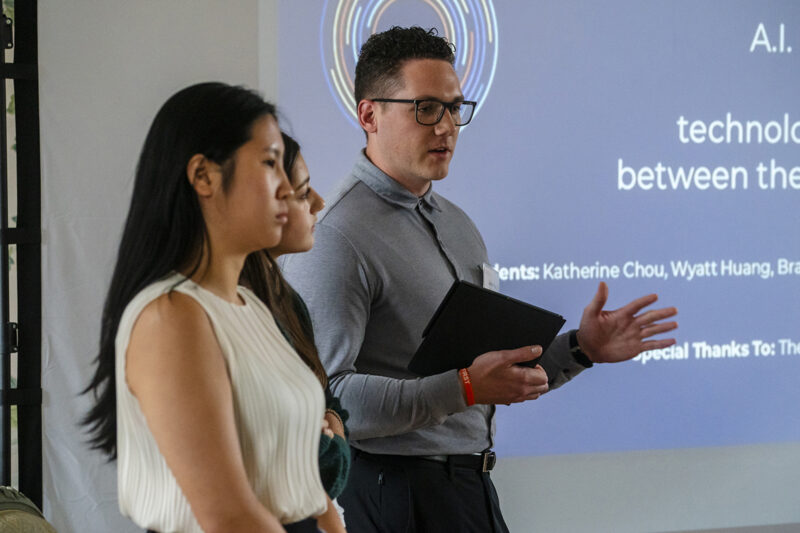From left: Yale undergraduates Katherine Chou and Addie Lowenstein and Jackson MPP student Jason Hug present their research ideas at the Next Frontier Seminar’s inaugural retreat in September.
As Jackson School students, Joyce Guo MPP ’24 and Graeme Clements MPP ’24 took part in a research project in which they explored the AI competition between the U.S. and China. The project, organized by the Yale Foreign Policy student organization, was supported by the Schmidt Program on Artificial Intelligence, Emerging Technologies, and National Power. The pair have now teamed with recent graduates from Stanford and Tufts University’s Fletcher School to turn that research experience into a nonprofit organization, the Next Frontier Seminar (NFS), which provides research and mentoring opportunities for undergraduate students interested in international security and emerging technology.
Through the program, students from Yale and peer institutions develop yearlong research projects on topics at the nexus of technology and security. In September, the NFS research teams kicked off their research projects at an inaugural retreat in Newport, Rhode Island. Students presented their research ideas to experts from academia, think thanks, private enterprise and the military, who engaged in discussions and provided extensive feedback.
“We recognized that there was an opportunity to facilitate these student-practitioner linkages more systematically and that real value would accrue to all involved — the Next Frontier Seminar helps make that a reality,” says Clements, a private equity investor and officer in the United States Navy Reserve.
While a student at Jackson, Clements led a Schmidt Program research project on the domestic Chinese semiconductor production ecosystem. He was impressed with the caliber of the work produced by the Yale undergraduates who took part in the project —and sees similar potential in the 20 undergraduate students (about half are from Yale) in the inaugural NFS cohort. “They hold tremendous promise as future thought leaders on technology-security issues,” he said.
“We hope our program helps them develop their passion for working in this increasingly critical domain and that, in turn, they find productive ways to apply that passion in their lives after school, whether in academia, industry or government,” he adds.
While at Yale, Guo was also inspired by the quality of work done by her undergraduate student research partners. Her Schmidt research project focused on the energy consumption ramifications of generative AI. With the growing need to innovate in AI and other technologies, NFS is mirroring the Schmidt Program’s approach of creating “an environment of interdisciplinary, intersectional, and international thinkers” by growing the mentorship network and connecting these students to their counterparts at peer schools.
“You need to bring together different perspectives and approaches to truly understand technology’s impact,” says Guo, who is now a senior research analyst at Chung-Hua Institution for Economic Research in Taiwan. “When you’re dealing with something as complex as AI, you can’t just look at it through one lens and expect to see the whole picture. We’ve carried that mindset forward in how we structure our research teams and approach problems.”
NFS manages a competitive application process, through which the organization selects graduate student team leaders who in turn manage undergraduates engaged in not-for-credit research on core challenges at the nexus of AI and national security. The Schmidt Program continues to support some of the student work, as well as advise on the overall NFS research agenda.
Currently, Jackson School graduate students Nicole Wong, Jason Hug, and Juan Otero are managing three such NFS research teams at Yale. As team leads, they regularly meet with the undergraduates to define their research focus and methodology, implement their research plan, and sharpen their subsequent written analyses and oral briefings. Guo and Clements also meet periodically with each team throughout the year to support the undergraduates in their research and the team leads in their group management.
“The success of our program really depends on the team leads’ dedication and leadership. The Jackson students have really stepped up to make this their own, and it’s been incredible to see how they’re shaping the organization’s future,” says Guo.
Otero, who worked as a technology-focused lawyer before beginning his studies at the Jackson School, leads an NFS research team examining Chinese data localization policies and their global implications.
“NFS is a remarkable platform that connects talented professionals and students from diverse fields to uncover meaningful insights into national security and emerging technologies,” says Otero. “This collaboration among experts, practitioners, and young researchers enables us to tackle complex, cross-border challenges — like those posed by China’s data governance frameworks — with well-informed and innovative perspectives.”
The teams will convene again to present their in-progress research at a mid-year summit in January at the Hoover Institution at Stanford University. The projects will culminate with a spring symposium in Washington, D.C., where students will present their findings to leading academics and policymakers.
